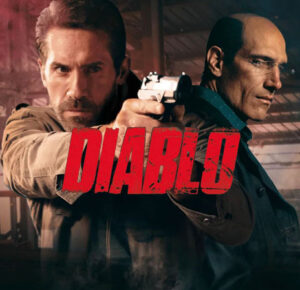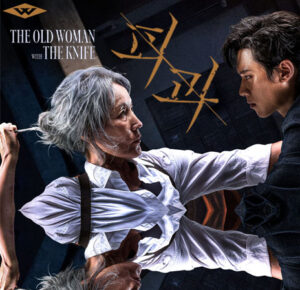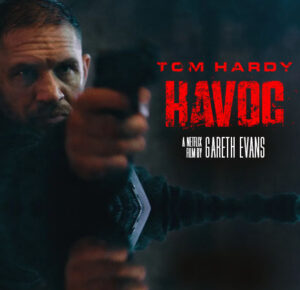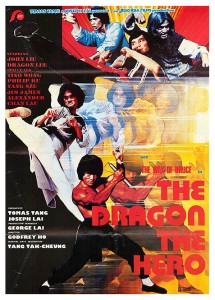 By Paul Bramhall
By Paul Bramhall
Many kung fu movie fans who have been around since the genre’s beginnings would arguably call the 70’s and 80’s the golden era. It was a time when the movies could be experienced first hand as they were released – whether it be going to check out Five Fingers of Death at a grindhouse movie theater on 42nd Street in New York, or heading down to the local video rental store to find the latest Cannon Films ninja movie – it was a good time to be alive.

Yuen Woo Ping. Say his name.
Then you have people like me, a product of the 80’s (all be it the very early 80’s). By the time I was born Bruce Lee had passed away close to a whole decade earlier, while I was still a twinkle in my parents eyes Jackie Chan was having his ass handed to him by Hwang In-sik, and while I was incapable of doing little more than gargling incoherently Sammo Hung was directing classics like The Prodigal Son.
Some would probably say I missed out on the real deal. But for me, I would argue that for fans of Asian cinema, we actually had a second golden era. It shone briefly and brightly, spanning roughly from 1999 – 2006, however it was the era responsible for getting me into the genre, and one which I dedicate this article to.
Back in ’99 I was a young and impressionable 17 year old who had just started his first full time job. I’d spent most of my teen years spending whatever money I made on VHS tapes of classic Hollywood movies from the likes of Martin Scorsese or Stanley Kubrick. However on one fine day I found myself with one of my co-workers going to check out a movie called The Matrix at the local cinema in Liverpool.

The Digital Video Disc revolution begins…
Skip forward a couple of hours later, and we both left the cinema with our jaws dragging on the floor behind us. It was possible to dodge bullets, Keanu Reeves was a kung fu master, there was no spoon, and we both decided we had to find out who on earth this guy called Yuen Woo Ping was. In one of those wonderful moments when all of the planets align, in the very same year DVD’s had just hit the market, and it had been written in the scriptures long before that the purchase which would pop my first pay packet cherry was to be a DVD player, everything else could wait.
The scriptures played out accordingly, and as it happened one of the first DVD labels to get space in UK stores like Virgin Megastore and HMV was a new distributor called Hong Kong Legends. Their first couple of releases featured a guy whose name I was vaguely familiar with (mainly because Sandra Bullock mentions him in Demolition Man) – Jackie Chan – and went by the names of Snake in the Eagles Shadow and Drunken Master. For someone who up until that point had very little exposure to Asian cinema, these two movies had the coolest titles ever, but it got better – on the back of the DVD cases it explained that they were directed by none other than Yuen Woo Ping. That guy!

1999 Flashback! Special DVD deals from that year.
And so began my love affair with Asian cinema, and while I wasn’t lucky enough to be around to check out the movies of the first golden era, I was there for the beginning of the next generation’s kung fu boom. Soon Asian cinema seemed to be more popular than ever before – less than a year after The Matrix a movie called Crouching Tiger, Hidden Dragon hit the screens, again with that guy Yuen Woo Ping. Suddenly Hollywood seemed awash with Hong Kong actors and directors – Jackie Chan, Jet Li, Chow Yun Fat, John Woo, Ring Lam, Tsui Hark, Corey Yuen – thanks to the 1997 handover of Hong Kong back to China, all of these guys had crossed the pond to make movies in Hollywood and I hadn’t even noticed.
The sudden early 2000’s interest in Asian style action and its timing with the release of the DVD format was one of the great pairings of the 20th Century. It may seem difficult to believe now, but for the longest time large media retail stores like HMV had dedicated DVD sections for Martial Arts, Asian Cinema, and World Cinema! Compared to now, when all three have been lumped under World Cinema, it was like living in a different era. During my lunch break from work I could usually be found eagerly browsing the Martial Arts sections waiting for a title to catch my eye, and back in those days, you were spoilt for choice.

Companies from around the world had “Eastern Heroes” for sale.
While Hong Kong Legends quickly established itself as the premiere label, there was a whole heap of other distributors all specializing in kung fu movies to choose from – Eastern Heroes, Soulblade, Vengeance Video, Optimum Asia, 55th Chamber, Hong Kong Connection, Wu Tang Classics, Moon Stone, and several more. The bigger labels like Hong Kong Legends and Eastern Heroes took full advantage of the DVD format, meaning often you could choose if you wanted to watch the movie in its original language or the English dubbed version, you could have subtitles or no subtitles, often there’d be interviews with the stars, and of course a certain Bey Logan quickly became known for his highly informative commentaries.
While watching the Hong Kong guys latest Hollywood efforts, at the same time I found myself going further back into their filmography and watching the movies that made them famous in the first place. Unsurprisingly, soon I found myself realizing that the Hollywood action movies that these guys were in sucked. Or more specifically, their older movies were just so amazing, it would be difficult to believe they could ever be topped. Imagine watching Rush Hour one day then viewing Police Story the next, sitting through The Replacement Killers then putting in the DVD of Hard Boiled, enduring Romeo Must Die then witnessing Shaolin Temple. Thanks to DVD, this is exactly what happened to me.
At the same time I found myself devouring several books that were still very much readily available around the start of the Millennium – Hong Kong Action Cinema by Bey Logan, The Essential Guide to Hong Kong Movies by Rick Baker and Toby Russell, Sex and Zen and a Bullet in the Head by Wikins Hammond and Mike Wilkins, Hong Kong Babylon by Fredric Dannen, Hong Kong’s Heroic Bloodshed Pocket Essentials by Martin Fitzgerald, Jackie Chan Pocket Essentials by Michelle Le Blanc and Colin Odell, Mondo Macabro – Weird and Wonderful Cinema Around the World by Pete Tombs, The Essential Guide to the Best of Eastern Heroes, and The Essential Guide to Deadly China Dolls.

Some of Paul Bramhall’s essential reading material.
I still own these books to this day, and to a large degree the contents within their pages dictated what I’d be watching for the next decade. Despite the large amount of kung fu available on UK retailers shelves, there were some titles that simply weren’t released on British shores, which led me into the world of online kung fu shopping. Little did I know that 10 years later online would pretty much be the only viable resource for getting my kung fu fix. Soon I was introduced to the world of online retailers such as HKflix and pokerindustries, both of which sadly no longer exist, but they served their purpose of exploding the world of kung fu collecting open to me. Up until that point I had no idea that across the pond in the US, they also had a whole variety of DVD labels specializing in kung fu movies as well!
There was a problem though – while it’s common knowledge now, back in 2000 the multi-region issue was still very much a hot topic. While the UK was Region 2, the US was Region 1, with most of Asia being Region 3. So technically if you bought a DVD form the US or Hong Kong, you wouldn’t be able to play it in the UK. The original reason behind region coding was to control the release dates of movies. If a movie was released on the cinema in the UK six months after it was shown in the US, the studios didn’t want to lose out by people in the UK being able to buy the US DVD, which in all likelihood would be released before it even hit UK cinema screens.
However it was soon revealed that many DVD players could be ‘hacked’ to play DVD’s no matter what the region, often by keying in a secret code on the remote control that the manufacturers had hidden away, then mysteriously had leaked to the online community. Skip forward to present day, and having a multi-region DVD player is all but a prerequisite to being a kung fu movie fan. To restrict yourself to only being able to buy DVD’s from one region would be like buying a whole pizza, then only having one slice of it. I still remember my first multi-region player, it was by today’s standards a monolithic looking black Samsung, and it did the job perfectly.

All good things do come to an end.
Suddenly for every Eastern Heroes there was a Ground Zero, for every Vengeance Video there was a Crash Cinema, for every Soulblade there was a Tai Seng, and of course, then there were the bootleg labels like Red Sun and Bonzai Media. However in 2002 news came that would bring smiles to both UK and US shores. Back then I’d often buy DVD’s from a site called cdwow, which had its own martial arts section, and one day a new title popped up for purchase called Heroes Two. Just based on the fact that it had a cool looking cover I purchased it, and as it would turn out, it would be my first Shaw Brothers movie, directed by none other than Chang Cheh, the Godfather of the Kung fu film which I had read so much about in the likes of ‘Hong Kong Action Cinema’ and ‘Mondo Macabro’.
I had inadvertently purchased my first Celestial IVL Shaw Brothers DVD, the first in what would ultimately become a collection coming close to 200. Up until that point I’d read a lot about the Shaw Brothers studio, both in books and online, but due to their poor DVD availability, I’d never actually seen one. All that changed in 2002, when a distributor called Celestial purchased the rights for the Shaw Brothers catalogue, and for the next 5 years consistently released wave after wave of remastered original language Shaw Brothers goodness. To give some idea of their output, to this day I still haven’t had a chance to watch every movie that I purchased from the Shaw Brothers catalogue.
The Shaw Brothers DVD’s weren’t the only Hong Kong releases that caught my interest though, as I’d soon discover that there was an almost countless number of kung fu movies which were available only on Hong Kong DVD. My collection started to fill up with DVD’s from distributors like Mei-Ah, Universe, and Deltamac. These DVD’s, often not blessed with the best picture quality and coming with subtitles that were usually a grammatical disaster, were perfect for finding the titles not considered worthy of being given a western release. Mr. Vampire may have gotten the deluxe treatment from Hong Kong Legends, but I bought the Deltamac versions of all of its sequels.

Pure and uncut. There’s no other way.
Not only that, sometimes the Hong Kong (or even Taiwanese) DVD release was the only was to see the movie uncut. The Deltamac version of the Jackie Chan movie Police Story 3: Supercop is the only uncut version out there, the same goes for the Thakral versions of Drunken Master 2 and Fist of Legend. Then you have the Funny DVD (best name for a distributor ever?) releases of Jackie Chan movies like Who Am I?, Rumble in the Bronx, and First Strike, which would have the English dubbed version on 1 side, and the longer Chinese version of the other. Hunting down the best DVD of the movie quickly became as much fun as actually watching it.
Things seemed to be as good as they could get, and they remained that way for the next few years. There was a never ending variety of kung fu DVD’s to collect, which is why I consider that it really was the second golden era. Then, in 2006, the first hints of trouble in paradise started to show through. The Hong Kong Legends label lost both Bey Logan and Brian White, two guys who had a passion for kung fu and knew how to turn it into a viable DVD business. As soon as they left the new owners Contender seemed at a loss as to what to do with the label, so simply chose to release a slew of shoddy Jackie Chan titles in the now long forgotten ‘Ultrabit’ format, along with any other unreleased titles that were laying around. One industry report stated that the last of the Hong Kong Legends releases barely shifted triple figures, and by 2007 the label had essentially closed shop.
Similarly, around the same time Celestial were reporting that their most recent DVD’s also weren’t shifting as many units as they’d anticipated, and their releases slowed down to a trickle. By the beginning of 2007, it seems that the golden era had come to a close, the smaller labels had disappeared all together, the martial arts sections on the high street stores had gone the way of the dinosaur, and the Future Release section that many online retailers had for Martial Arts DVD’s suddenly started returning No Results. For a period of around 8 years things had been great, and no doubt during this time many people were turned onto the genre, weather it be guys like me who got in from the start of it, or those that jumped onboard somewhere along the way, exposure is everything.

Image courtesy of Nectarsis/shaolinchamber36.
By 2010 the titles that I picked up for $10 – $20 were now showing up on the likes of amazon and ebay sporting prices ranging from $50 to, in some insane cases, $250. With no distributors to re-press the DVD’s, titles started becoming out of print like nobody’s business. In many cases even a movie with shoddy picture and sound quality, with nothing but the English dub, would become a collectors item purely by default as it was the only version out there. The kung fu movie was no longer accessible to the average joe on the street, and once again became limited to being the passion of the niche market it had attracted while the going was good.
As of the time of writing, I can now say it’s a genre I’ve been into for 15 years, which means that, apart from the fact that I’m getting old (although not as old as those guys who’ve been into it since the 70’s!), I’ve at least built up enough knowledge to believe I know what I’m talking about when it comes to kung fu movies. Some would say it’s the only thing that I know what I’m talking about. Thankfully, things aren’t quite as grim as they were in the latter 2000’s, movies like The Raid have once again crossed into mainstream culture, exposing audiences to some brutal martial arts action who normally wouldn’t check it out. Characters like Ip Man and Wong Fei Hung have also stirred audiences feelings for the martial arts heroes of old, renewing interest where previously it had faded away.

Author, Paul Bramhall, hosting the premiere of the Kim Tai-jung classic “Miss, Please Be Patient” in Sydney’s Korean Cultural Office.
This resurgence of interest in a healthy dose of fist and feet action will hopefully once again spill over into the world of DVD collecting. The Terracotta Distribution label in the UK has already jumped into the deep end with the first title of their Classic Kung Fu Collection, Hero of Shaolin, and distributors stateside have also been doing their part with labels like Shout! Factory releasing awesome sets featuring the likes of Angela Mao and Jimmy Wang Yu.
So, all in all, the future of the kung fu movie collector is looking brighter than it has in a long time, and if The Raid has done for some people what The Matrix did for me way back in 1999, then hopefully the number of those collectors will only continue to grow, and we can once again be spoilt for choice on what we’re going to buy next.
Don’t miss our related post, “Evolution of Collecting Kung Fu & Asian Film,” which is essentially the prequel to this article! Special thanks to Kung Fu Bob, Nectarsis, Shaolin Shamber 36 as well as another unnamed individual for the images.















 By Paul Bramhall
By Paul Bramhall














18 Comments